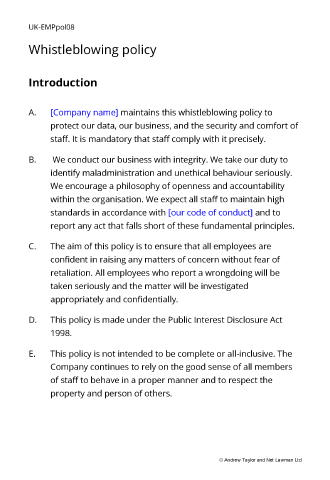Whistleblowing policy

Document overview

 England & Wales
England & Wales Scotland
Scotland

- Length:5 pages (2100 words)
- Available in:
 Microsoft Word DOCX
Microsoft Word DOCX Apple Pages
Apple Pages RTF
RTF

If the document isn’t right for your circumstances for any reason, just tell us and we’ll refund you in full immediately.

We avoid legal terminology unless necessary. Plain English makes our documents easy to understand, easy to edit and more likely to be accepted.

You don’t need legal knowledge to use our documents. We explain what to edit and how in the guidance notes included at the end of the document.

Email us with questions about editing your document. Use our Lawyer Assist service if you’d like our legal team to check your document will do as you intend.

Our documents comply with the latest relevant law. Our lawyers regularly review how new law affects each document in our library.
About this policy document
We usually come across the term whistleblowing in conjunction with an employee alerting a governing body about the law having been broken by a company or by employees of a company.
However, the term can have a broader meaning of informing another party of malpractice within the workplace. The action being reported doesn't have to be illegal - it could just simply have breached business policy guidelines. Nor does the authority to whom the action is reported have to be an independent third party such as an industry regulatory body. It could be a line manager or working group.
This document sets out the circumstances under which your staff should speak out, helping to ensure that their concerns are heard. It helps you comply with your obligations under the Employment Rights Act and other employment legislation, but also encourages employees to report circumstances where the ethical (rather than legal) position of the business might be compromised.
If implemented in line with the explanatory notes we provide with the document itself, your whistleblowing policy can also prove useful as a way to spot potential problems before they happen.
The law relating to this policy
This policy template helps you comply with legislation under the Employment Rights Act 1996 as amended by the Public Interest Disclosure Act 1998. These acts govern the making of disclosures concerning workplace activities and are intended to protect employees who profess from being subject to any detrimental or unfair treatment as a result.
Application and features
Covers a wide range of issues: from criminal offences to the protection of the environment, endangerment of health & safety of any individual and deliberate concealment
Doubles as a risk management policy that could help to prevent escalations of malpractice
Provides both you and your employees with an easy reference point as to how to raise concerns in the workplace
Document and explanatory notes in plain English
Contents
- Company statement
- Explanation of whistleblowing
- Named people responsible for implementing the policy
- When to use the policy
- Reporting procedure
- Investigation of disclosure
- Dissatisfaction with organistaion decision
- Confidentiality
- Untrue disclosures
- Review of policy

Choose the level of support you need
Document Only
This document
Detailed guidance notes explaining how to edit each paragraph
Lawyer Assist
This document
Detailed guidance notes explaining how to edit each paragraph
Unlimited email support - ask our legal team any question related to completing the document
- Review of your edited document by our legal team including:
- reporting on whether your changes comply with the law
- answering your questions about how to word a new clause or achieve an outcome
- checking that your use of defined terms is correct and consistent
- correcting spelling mistakes
- reformatting the document ready to sign
All rights reserved
